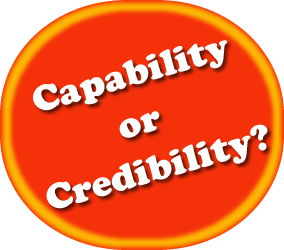I’ve been working in Management and Executive Development for over 20 years now and I’ve never been more convinced of the importance to businesses of having capable leaders. In challenging times, we all want managers and leaders who can deliver results.
What I’ve realised recently is that the key is not in the capability of our managers and leaders but in their credibility. And these are two entirely different things.
Capability is about what you can do and what you can achieve. It relates to potential and perhaps to
past history. Credibility is about what other people believe you can do and believe you will do. Credibility is what inspires other people to follow your lead, not capability.
Ok, it’s not easy to get credibility without capability. I’m not saying we don’t need capability. It’s just that capability alone won’t change anything. The epitome of this is the Senior Manager who spends several years of valuable time studying for an MBA, writes a superb dissertation and does absolutely nothing different with all their new knowledge.
In fact, acquiring extra capability and not using it can detract from a person’s credibility quite dramatically. Think about it – do you really respect the person with the MBA if you don’t see any change in what they do after the course?
Come to that, it’s not just about the MBAs. If a person attends any kind of training programme and no increase in results is visible, it can be damaging to their credibility. And yet, lots of managers and leaders shy away from doing something different, because they are afraid of receiving a barrage of ridicule and cynicism: “Been on a course, have you?”
Is this why some Senior HR Practitioners think that leadership and management training doesn’t work? Well, it’s true that not all training makes an appreciable difference to leadership behaviour.
Could that be because the trainers don’t have sufficient credibility to inspire leaders and managers to do something new?
Credibility comes not just from having the capability to do something or from a string of qualifications, but from the choices we make, the actions we take and from the results we achieve.
The manager who avoids difficult situations or who waits too long to tackle a problem will lose credibility very quickly. The one who acknowledges the problem even if he doesn’t have an immediate solution will gain more credibility than the one who seems to have his head in the sand.
In difficult times we don’t just need managers who can get things done. We need leaders we can believe in.






